Archive for the ‘SUNY Cortland’
I am finishing my final year as a Teaching English as a Second Language major with a minor in Spanish. After Cortland I plan on moving back to Columbia to be an English professor.
I do receive some financial help from the Pell Grant, but I still have to work year-round to cover the other expenses, like all of the textbooks I need for my classes. I typically work full-time in the summer months, and I also work at Neubig Dining Hall between classes to get by. As far as food goes, I do have a meal plan that I have to pay for out- of pocket, but I also work in one of the dining halls so I’m not a big fan of working around the same food I have to eat.


I am currently in my final year at SUNY Cortland as a Spanish and Teaching English as a Second Language double major. The only financial aid I qualify for is like $50 from TAP, which really doesn’t cover anything. In the summer, I work full-time as a secretary to help cover my college expenses, like room and board and tuition.
I don’t have time during the school year to work because of how demanding my majors are. Also, I have to drive myself to and from my observation hours. That can get really expensive, but I still have to pay for that out of pocket on top of everything else.
I have a meal plan but the food and the hours for dining halls are so ridiculous that I normally eat off campus, not to mention the food on campus is more expensive than off-campus food! I think we need to have fully funded SUNY so we don’t have debt until we die and won’t affect our credit scores for the future when we really need them.


 As a college student I knew I would have my fair share of financial issues. Applying for scholarships, grants and taking out loans can be a painful process, especially when you’re deemed not poor enough to get actual help and not rich enough to cover the expenses.
As a college student I knew I would have my fair share of financial issues. Applying for scholarships, grants and taking out loans can be a painful process, especially when you’re deemed not poor enough to get actual help and not rich enough to cover the expenses.
I’m a sophomore at SUNY Cortland and am currently in the BFA studying studio art but I plan on changing my major to gear more towards illustration/animation. My career goals involve working for major companies creating storyboard art for tv shows/movies or video games. As an artist I understand that right from the get go I won’t have an immediate high paying job. It’s something I will have to work hard for and I look forward to that part of my life. Furthermore as an artist, I know money will be tight but I haven’t even stepped foot into that career field yet and I’m already facing many financial struggles that I was under the impression would be taken care of.
As of right now I have received the federal Pell Grant, TAP, federal Perkins loan and other loans and I also work to get myself through school. And sadly that still isn’t enough. Due to a low credit score I am unqualified to get more loans that would pile on to my amount of debt. I couldn’t afford to pay my tuition up front so now I make monthly payments, any money I earn I can barely touch because it goes towards a $500 monthly payment plan that my mom struggles to help me with.
Any time I need to spend money or finally agree to eat out, I always check in with my mom to see if I can afford it. I report back to her any payments I made so we can keep track of our funds. The Excelsior Scholarship promised to aid those making $100,000 a year or less. I fall under that category as do many others. The Excelsior Scholarship also claimed it would cover tuition payments and as years progressed the threshold would increase so no one had to pay for college and be in debt. Sounds great right?
And it is, in theory. I understand that when any new program rolls out there are bumps in the road but my experience with the scholarship was anything but helpful. If the items on your college bill don’t have the word “tuition” in it you pay for it yourself. Though it’s true that any amount of money is helpful, the specific qualifications for the scholarship helped as little people as possible. One of my friends who received it only got $1,000. After receiving financial aid, federal aid etc and receiving the Excelsior Scholarship, I thought I was finally free of counting pennies to see if I could buy a half gallon of milk, I was wrong. The Excelsior Scholarship only allows up to $5,000 per student for solely tuition. This scholarship doesn’t include dorms, meal plans, studio fees, lab fees, athletic fees, transportation fees etc.
After going back and forth with the financial aid office (who were not given information about the Excelsior Scholarship) and the Excelsior Scholarship office for two weeks, I thought I wouldn’t be able to attend college again and I would have to stay home to work. Luckily I was able to take out a loan and work some more with the financial aid office and dip into my savings account. In the end, I chose to stick with the aid I was already receiving because it came out to more than the scholarship. But why do I have to choose?
The financial aid office also required my parents 2015 tax records, my financial situation has changed drastically in two years! Looking at recent records most likely would have helped me get more aid but that is not the way the system works. I want to study abroad so I have a savings account but on more than one occasion we’ve had to dip in to help with payments. So I work more to save more money which gets exhausting and cuts into my social life, but I wouldn’t even be able to go to college without this job so I have to keep working. Life isn’t easy, people have to make sacrifices and work hard, but college is about getting integrated into adult life slowly, not getting thrown in and suffering all the way through.


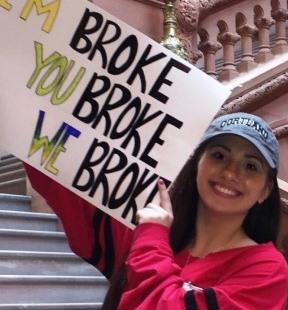
After losing my father in high school, I didn’t realize I’d have to lean so heavily on my mother for assistance. No one in my family has been able to achieve a four-year degree yet. That has been my motivation to work hard to make them proud. My mother wisely invested in a savings account for my education, unfortunately the funds only partially cover the costs for the first two years of SUNY Cortland and the costs only seem to be going up.
I work full-time over the summers at an assisted living center and was fortunate enough to secure one of the limited spots in the Work Study Program to put towards the costs of living at Cortland. While it is difficult to keep up with the expense of food, transportation and other unavoidable essentials, I am thankful to have been accepted into work-study because it helps reduce my tuition costs and enables me to have some extra cash during the semester.


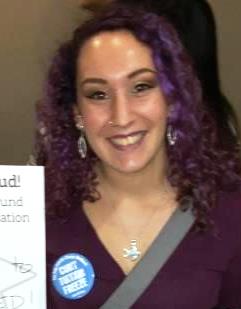
As a senior in high school, I was aware of the vast expenses that accompanied a college education. I was raised in a single parent household, as my father was incarcerated early in my life. My mother, a waitress, did her best to prepare me and my brother for college. Still, I’ve taken out multiple loans in my name, in addition to a Parent Plus loan in my mother’s name. These loans cover tuition and a portion of living expenses, however I pay for the remainder. In addition to being a full-time psychology major with an extensive workload, I work two jobs during the academic year and full-time over the summers to cover cost of living expenses at Cortland.
After I finish my psychology studies here at Cortland, I plan on attending graduate school to study clinical psychology. I love it, why people think the way they do. Everybody deserves the opportunity I’ve gotten, even though it’s been hard. Without education access, our future is much dimmer.



As a Junior at SUNY Cortland, I juggle a full course load in biochemistry, part-time work, and extracurricular activities. I am enrolled in the Work-Study program on-campus and I am a Green Representative. Sponsored by Residence Life and Housing and Physical Plant, the Green Rep program inspires sustainable lifestyles through peer to peer environmental education programs. I also find time to be a Supplemental Instruction (SI) tutor. I’m concerned about be able to fully pay back my student loans. If I don’t get a job, then I’m going to be in debt for my whole life, it seems.


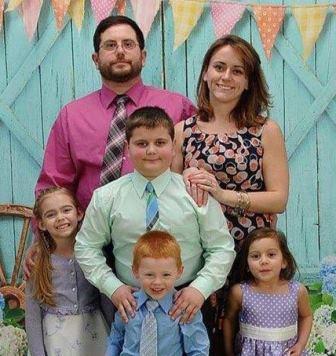
I am a married father with two biological and two foster children. I went to school later in life out of economic necessity. Higher education affordability is very important to me. In 2012 I was denied a much-needed promotion. Simultaneously, my wife became pregnant with our daughter. The reality of the world hit us. My family couldn’t afford to live on my salary any longer, so I decided to leave the workforce to pursue a bachelor’s degree.
After excelling at Onondaga Community College, I transferred to SUNY Cortland where a large portion of my educational expenses were covered by aid. However, despite working upwards of 25 hours a week, I still had to take out loans to cover additional costs associated with getting a degree like transportation, rent, and textbooks. I could not afford to satisfy these costs juggling a full-course load and part-time work.
I will be graduating in May and will be pursuing a doctorate of physical therapy coupled with a master of public health from Adelphi University. My hope is that I can progress into the world of rehabilitation in the hospital setting, working with spinal cord injury patients.



I am a senior in the criminology program and an aspiring law school candidate. My education would not have been possible without taking on a substantial amount of student loan debt. I am frightened when it comes to paying back my loans.
My loans cover tuition costs, and that’s it. I have to pay for cost-of-living expense such as rent, food, and transportation out of pocket. I participate in the work-study program and am enrolled in the Equal Opportunity Program (EOP). Investing in higher education will allow students like me the opportunity to grow as individuals, and ultimately positively affect the great state of New York.


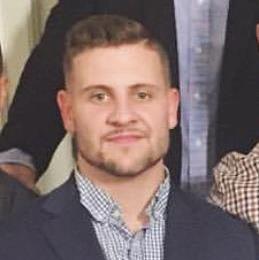 I am a senior at SUNY Cortland, majoring in fitness development and hoping to open my own gym one day. Attending Cortland has been the greatest decision I’ve ever made. I wouldn’t have been able to go to school without taking on a massive amount of student debt. With increased tuition and academic costs, my family has felt the financial burden associated with a college education.
I am a senior at SUNY Cortland, majoring in fitness development and hoping to open my own gym one day. Attending Cortland has been the greatest decision I’ve ever made. I wouldn’t have been able to go to school without taking on a massive amount of student debt. With increased tuition and academic costs, my family has felt the financial burden associated with a college education.
Both myself and my brother attended Cortland simultaneously for two years, making it even more difficult for my family to afford. New Yorkers should have access to higher education at an affordable rate. Invest in higher education to help CUNY and SUNY students make an impact.


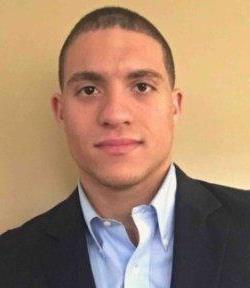
As an out-of-state student, I’m one of the few and far between at SUNY Cortland. I’m a student-athlete and attend Cortland with my brother, effectually doubling the financial burden on our family. Going to school with my brother has been a great experience, however it has definitely been harder for my family to get by. I know the importance of a college degree and have worked countless hours over the summer and winter breaks to save enough money to cover the cost-of-living expenses as an off-campus resident. On top of working long hours, my brother and I have taken on a substantial amount of student loans to cover the sky-rocketing tuition and related academic costs at SUNY Cortland.
I currently am an intern with the Marketing Department on-campus, an All-American Red Dragon football player, and a full-time student with the accompanying course load. Should I also have the added worry about covering the costs of higher education? Most would agree that I shouldn’t. I have had such a great experience here at Cortland as a student-athlete and a communications major. I would hate to see this opportunity that I’ve been given made more exclusive through increasing tuition and costs. That would be a shame.

 As a college student I knew I would have my fair share of financial issues. Applying for scholarships, grants and taking out loans can be a painful process, especially when you’re deemed not poor enough to get actual help and not rich enough to cover the expenses.
As a college student I knew I would have my fair share of financial issues. Applying for scholarships, grants and taking out loans can be a painful process, especially when you’re deemed not poor enough to get actual help and not rich enough to cover the expenses. 




 I am a senior at SUNY Cortland, majoring in fitness development and hoping to open my own gym one day. Attending Cortland has been the greatest decision I’ve ever made. I wouldn’t have been able to go to school without taking on a massive amount of student debt. With increased tuition and academic costs, my family has felt the financial burden associated with a college education.
I am a senior at SUNY Cortland, majoring in fitness development and hoping to open my own gym one day. Attending Cortland has been the greatest decision I’ve ever made. I wouldn’t have been able to go to school without taking on a massive amount of student debt. With increased tuition and academic costs, my family has felt the financial burden associated with a college education.